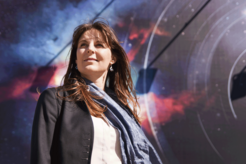Searching for the origins of life
Lisa Kaltenegger receives $1 million award from Simons Foundation for her research into exoplanets
Lisa Kaltenegger from the Max Planck Institute for Astronomy and Harvard-Smithsonian Center for Astrophysics, has been named as one of the investigators of the Simons Collaboration on the Origins of Life. Kaltenegger is an expert on characterising exoplanets. The focus of her works lies on detecting life-friendly conditions on these celestial objects, which orbit stars other than the Sun. The Simons Foundation Investigator Award amounts to $1 million.

How life began is one of the great unsolved questions of our age. Now the Simons Foundation, based in New York City, has launched a collaborative effort to advance our understanding of how life began: The Simons Collaboration on the Origins of Life will bring together researchers from fields as far apart as astrophysics and molecular biology to tackle questions as diverse as those about the astronomical context of the emergence of life on Earth and the chemical processes that produced the first self-replicating protocells.
The Simons Collaboration is co-chaired by Nobel Laureate Jack Szostak, a specialist on the emergence of cell-like, self-replicating structures from pre-life chemistry, and astronomer Dimiter Sasselov, Director of Harvard University's Origins of Life Initiative. It includes experts such as the British Astronomer Royal, Martin Rees, and distinguished Harvard chemist George Whitesides.
Now, Lisa Kaltenegger has been named as one of the Collaboration's investigators. Kaltenegger, who holds a dual position as a DFG Emmy Noether research group leader of the "Super-Earths and Life" group at the Max Planck Institute for Astronomy and as a research associate at the Harvard Smithsonian Center for Astrophysics, is a specialist for those exoplanets that are most interesting for the search for life on other worlds: earth-like, rocky planets with just the right characteristics to allow for the existence of liquid water – a precondition for life as we know it.
Kaltenegger will receive a Simons Foundation Investigator Award of $1 million on September 1, 2014. The award will enable her to study models for the "spectral fingerprints" of exoplanet atmospheres – the minute traces left by different chemical elements in those atmospheres in light received from those distant planetary systems. In modeling spectral fingerprints for earth-like planets, which are currently beyond the range of observation, and exploring the effect of living organisms, but also of different geological features on these spectral fingerprints, Kaltenegger will prepare the ground for future observations that might one day find life on those yet undiscovered worlds.
"This award is an amazing opportunity to explore the range of different worlds out there," Kaltenegger says: "With such a wide range of investigators from biology to astronomy, the Simons Collaboration offers a unique opportunity to learn more about other worlds and the origin of life – and it's exciting to be a part of that!"
MP / HOR
